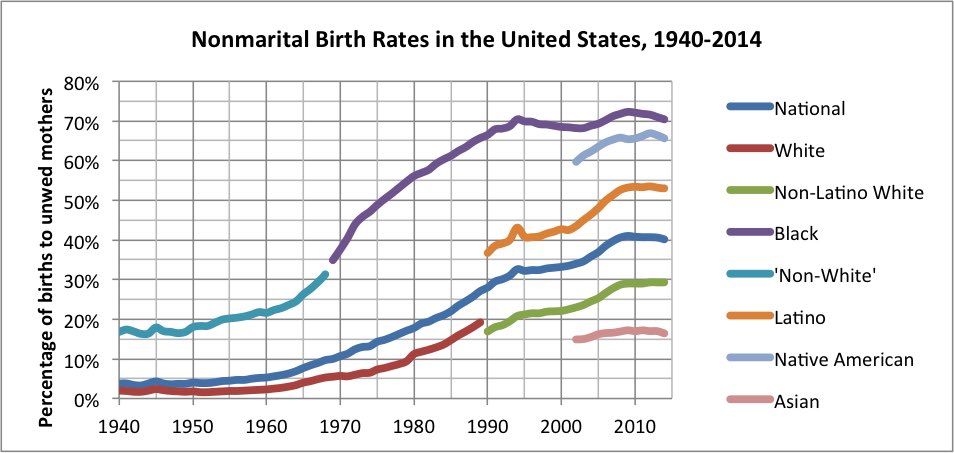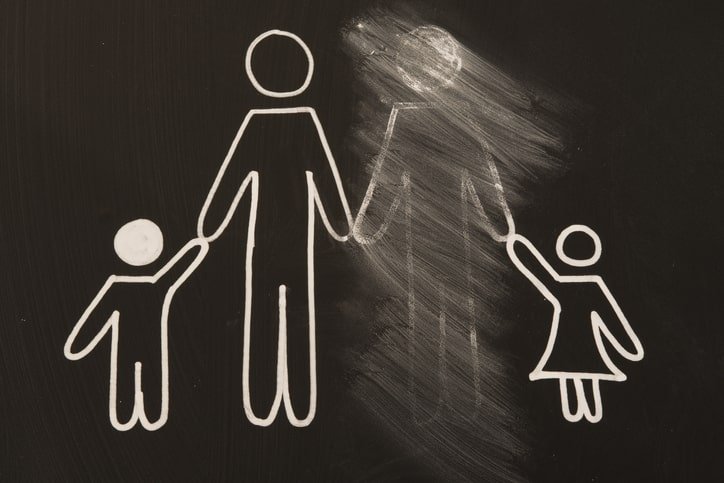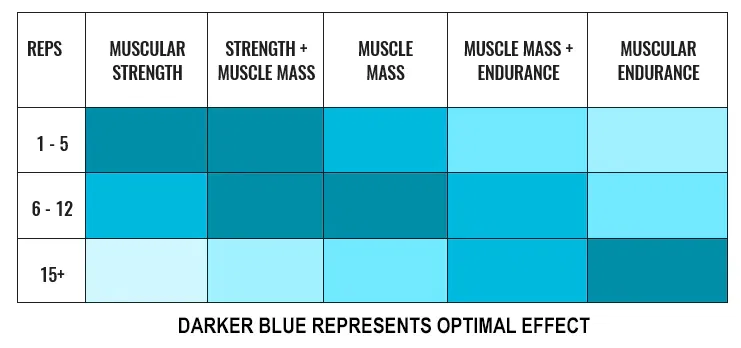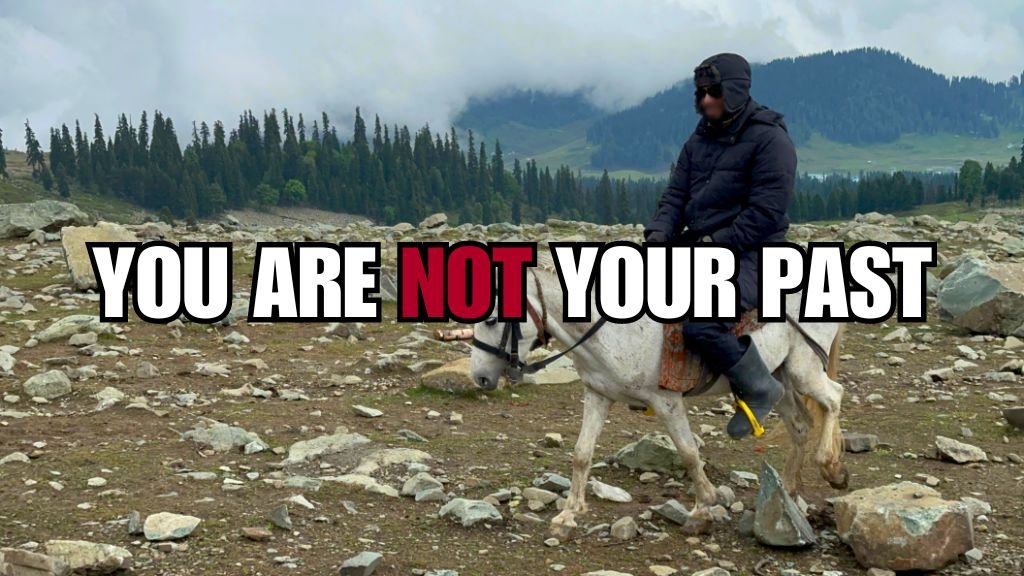LMM’s Note: This is a guest post by Ed Latimore. I recently came across some statistics that blew my mind.
40% of all American children are born out of wedlock (unmarried parents), and for black people, it’s 70%.

India is a fairly stable society, so we don’t really have a lot of bastard children – and I suppose that we just take having a stable family for granted. It appears that the Anglosphere has ruined their society, and their children are paying the price.
I wanted to help, so I got in touch with Ed Latimore, a pretty successful black American friend of mine from Twitter, who was raised by a single mother and had to overcome the struggles of not having a father to guide him (or even knowing what a real family looks like), and I asked him to pen down an advice post for people who grew up in that situation.
Below is what Ed had to say:
Being raised in a broken home and by a single mother is the perfect recipe to become a weak and ineffective man. I know this because I was raised in this setting and there were a plethora of problems that I had to overcome before I was able to become the person that I am today.
The problem with coming from an environment like this is that there are rarely any examples of productive citizens to emulate.
The Problem with No Father in the Home
Without a father in the home, you never get to see what relationships looks like. Growing up poor means that you never get to see what fiscal responsibility looks like. The values you learn are typically ones of reactive survival rather than or proactive progression.
In this world, violence is both the cause of and solution to most problems. Therefore, you never learn how to deal with obstacles without the use of miscalibrated judgement. Young men from this environment are either too reactive and aggressive or too timid and indirect when they encounter problems in their personal life. Both reactions cause the problem to grow larger, either through agitation or neglect.
The end result is that boys from broken homes can’t become men because they’re either too weak to shoulder the masculine burdens of responsibility or they’re too aggressive to work with civilized society. In either case, there is a resistance to discipline.
In the latter case, the boy won’t listen. In the former, he’s afraid to. Either way, the challenge boys from broken homes face is that they’re ill equipped to fulfill the roles of adulthood, especially the demands of manhood.
The Problem with Being Raised by a Single Mother
I’m not here to discuss the various reasons why single mother households exist. That’s a discussion for a different article. What I am here to discuss are the biggest problems with it and what a young man has to do to overcome those problems.
Generally speaking, women are favored in modern western society. We see this in everything from the abundance of women in higher education to the deficit of women in prison and homeless shelters. It even starts when they’re younger, as we can see that boys are 4 times more likely to be diagnosed with ADHD. For all intents and purposes, women are treated as a superior class.
While I have no personal problem with this (men are stronger and take risks, which ultimately means there are more winners AND losers), it does come with a particular condition. Women are generally shielded from the negative consequences of their bad decisions, either by societal expectations or by legal enforcement. In other words, they are privileged.
If you’re out with your girlfriend and she decides to confront some random man, not only are you expected to fight on her behalf if the situation escalates, her attacker would be considered in the wrong for physical retaliation, even if she did something to warrant the attack. And even if she got in trouble, the law is going to be far more lenient on her than if it were two men fighting.
The problem that boys face when raised by single mothers is that they’re examples for behavior come from someone who will not receive the same level of punishment. A man can’t afford to act the same way as a woman because he will not be judged like a woman. I don’t mean to say that women aren’t capable of being responsible. Only that there is a much greater margin for error being a woman than a man.
So much so that in most cases, she doesn’t realize that she’s receiving better treatment.
Single Mom + No Father + Poverty = Weak men
Boys from single parent households in poor neighborhoods lack strong role models for masculinity. Without fathers in the home, they suffer from the following issues:
- They’re more likely to behave in a way that either maximizes survival (they become meek and submissive) or maximizes emotional expression (giving their emotions too much weight).
- They’re more likely to resist masculine authority and the burden of masculinity because they grew up in an environment where masculinity was either actively resisted or the masculinity they knew neglected or abused them.
This is the recipe for building misguided boys who will grow into broken men.
I know this because I dealt with the same issues, coming from a background of a single mother and being raised in poverty.
However, I did not succumb to the fate of so many who come from my position. I recognized many of the areas I lacked and I was able to overcome them and develop myself into a functional man.
Here Are the Problems I Primarily Had to Overcome
Bad with money
I was 18 when my father died and I received $55,000 in life insurance money. Within 18 months, I was so broke that I was overdrawing my account just to have money to feed myself. During this time period, I was temporarily homeless as well.
I didn’t get much better with money in my 20s either, because I never got to see anyone save money or really make money.
No idea how to have a relationship
I once dated a girl and she made an interesting observation.
She remarked that I had no idea what a loving relationship looks like because I grew up with a single mother. At the time, the comment annoyed me, but as I got older I realized that there was a lot of truth in what she said.
Not only was there a lot of truth, it affected how I conducted myself in every relationship that I had, and that effect was never positive.
Assertiveness and confidence
It’s easy for kids from a broken home to make themselves the center of attention. It’s a lot harder for them to behave in a manner that makes them respectable.
For most of my life, I confused being liked with being respected. The problem with this confusion is that when you’re a child, the distinction isn’t particularly important or even noticeable. However, as you become a young adult and grow into maturity, being respected is far more important.
The problem is that when you come from a broken home and the environment that tends to accompany it, you rarely see examples of respectable behavior. Instead, what you see are examples of behaviors to become popular.
The wrong focus
When you’re a young man in this environment and you’re seeking approval, you chase the lowest common denominator. This comes back to choosing being liked and being respected. We take the path of being liked because it requires less but comes with the false promise of getting more. When you have the wrong focus, that promise is adoration from people you don’t even want to be like.
What I mean by this is that young men from broken homes tend to grow up chasing women as a source of approval. One of the most common insults in the hood is “I get more bitches than you.” The idea is that your value is determined solely by the amount of (usually low quality) women you can attract. Since these women are from the same area, they have low standards for the men they get with, which perpetuates the same detrimental traits amongst the men. This unfortunately perpetuates the cycle of single motherhood and broken homes.
How to Fix Yourself After Being Raised by a Single Mom in a Broken Home
After dealing with these problems myself, I’ve come up with a formula that I think every man raised by a single mother or reared in a broken home can use to shape himself into a man capable of rising above his surroundings.
Play sports
Athletics are one of the few areas where masculine values are encouraged and celebrated.
You quickly learn the value of sacrifice and hard work if you want to excel. You become accountable to teammates or to a coach (for those involved in non team sports). You learn how to get control of your emotions.
You learn to practice when you don’t want to practice. You learn to shut up when you think you’re right. You learn, above all other things, that your feelings about a situation do not matter. All that matters is the obstacle in front of you and what you’re going to do about it.
Many young men from broken homes never see the value of long term investment into something. They don’t see it financially or in any relationships. Sports are the easiest way for a young man to see what’s possible when you stick to something and invest time into it.
By observing the physical changes that take place within the respect gained from those around him for his performance, you learn what happens when you stick with something longer than the temporal pleasure and excitement that comes with approval.
Learn chess and poker
I chose these games for two reasons. First, the cost barrier is low. It’s cheap and easy to come across a chess set or deck of cards. However, they have a tremendous return on investment.
The second reason is that chess and poker are wonderful for developing some key components of masculinity that you don’t get a chance to expose yourself to in a broken home. In chess, we learn how to think and deliberate over an action. There is no luck or chance in the sense that there is nothing that influences the game that is beyond your control.
Even a sport like boxing – which one could argue that has the greatest burden of responsibility and least interference of luck–doesn’t have the feature where both participants are in complete control of all elements of the game. This means that if you lose a chess match, then it’s because you didn’t consider something. It’s up to you to learn from this so that it doesn’t happen the next time.
We learn poker for almost the exact opposite reason.
A man has to learn how to deal with the weight of frustration and disappointment of things turning out badly even when he does his best. Poker is one of those games where you can do all the right things and still lose. You can, on occasion, do all the wrong things and still win. The latter scenario can teach you just as much as the former but for entirely different reasons.
Granted, you can get these lessons in many places and through many experiences, but learning them the hard way is not ideal because you may not survive the test in a condition to reap the benefits. These are proxy games where your emotions and mindset are sharpened in a way that even the best school can’t accomplish. And realistically, the schools that guys from this kind of home can attend aren’t typically that great to begin with.
Work in customer service and sales
This is an important step. No matter what you end up doing in life, holding these two types of jobs will shape you in two crucial areas that broken homes tend to neglect.
First, in customer service you learn how to be humble and diligent in the face of degenerate treatment. While every customer service job doesn’t necessarily guarantee that you’ll be treated like trash by the customers and employees, it is a guarantee that you’ll be paid a low wage, have no control over the people you have to interact with, and–if you want to keep your job–do it with a smile.
Working in customer service is a paid internship in emotional discipline. This should make you ambitious in a way that just being impoverished simply can’t.
We’ve already established that coming from a broken environment leaves you without financial and emotional role models. However, it also does nothing to make you ambitious enough to escape that world.
If customer service reminds you of the drudgery and lack of options that comes from not developing yourself, a sales job will single-handedly show you what’s possible when you “pull yourself up by your bootstraps.” When you work in sales, you live on an “eat what you kill” basis. This is the closest thing to a rite of passage that many men will ever go through.
Every other suggestion up until this point has been, more or less, a game. Some of the games have been serious, but you always have the option to not play. This is not the case for work. While you can choose the type of work that you engage in, you do not get to choose whether you earn a living or not. We take this necessary condition and turn it into a proving ground to develop masculinity.
Make friendships based on progress
It doesn’t matter if your friends are male or female, rich or poor, or from a balanced or broken home. What matters is that you want to make friends with other ambitious people.
Exactly what they’re ambitious in doesn’t matter. As long as it doesn’t take advantage of innocent people or break the law, it’s fine.
Spend time with people who want to improve, acquire, impact, or influence. They have a “never settle, I can always be better, give more and do more” attitude. If you’re doing things right, then you’ll attract these people, if for no other reason than you’ll repel everyone else.
This is going to be the most difficult part because when you’re from a broken home, the one thing you crave more than anything else is acceptance–even more so than a normal young person. It’s much easier to fall in with groups who like you rather than ones where you have to build yourself up to and earn the respect of.
I have no friends from my childhood neighborhood. I don’t even keep contact with some family members from my childhood. All of my friends are made through sports, chess, or my academic pursuits–not just school buddies. These people pushed me to be better and I learned a lot about life merely by being in their presence and continuing to behave in a manner that made me worthy of their friendship.
What isn’t included
I realize that this has become somewhat of a “best practices” for developing yourself into a man. In fact, I think everyone should take these tasks on to better themselves, regardless of their origins. In drawing that comparison, I want to point out a few ideas that I didn’t include which typically make it on to these types of lists.
Working out
As for working out, it’s great for getting in shape. However, young men have the ability to train AND get in shape as well.
If you’re under the age of 30 and you have time to get to the gym consistently, train to take an amateur fight (Boxing or MMA) instead. You’ll get in much better shape and have your mind and emotions tested in a way that is not possible in our modern world.
It’s not that working out is a bad idea. It’s just that you’re forced to grow and develop if you take on a sport–preferably a combat one.
Dating
Having a relationship is nice but if you haven’t done the work on yourself, then it’s at best, a distraction and at worst, a liability.
If you’re a young man from a broken home, you almost certainly view women in the wrong light. You either idolize or disdain them. Both of these positions set you up to have horrible relationships with women that hurt you as much as you hurt them. However, I’d be naively foolish if I thought that you could just be a monk and ignore women until you get right. Instead, what I recommend is this.
Stay focused on what you’re doing and never sacrifice progress for pleasure. If you do this, a funny thing will happen: you’ll not only become more attractive, but you’ll also develop a more balanced perspective of women.
In closing
The hardest part about being a young man from a broken home who is raised by a single mother is that you only get one gender’s perspective of the world.
What you’ll have to do is seek out guidance, responsibility, and your own personal rites of passage. You’ll have to learn emotional discipline and control, because the world will punish you for lacking it way harder than it will punish a woman. The deck is stacked against you but if you follow these suggestions, you’ve got a decent chance of making it through all of this.
The rest is up to you.
About the author: Ed Latimore is a former professional heavyweight boxer, a competitive chess player, and a bestselling author. Ed’s writing focuses on self-development, realizing your potential, and sobriety — all of which he approaches from personal experience, overcoming poverty and addiction. Check out his blog, get his books, follow him on Twitter, and sign up for his newsletter.










![Traits Women Find Attractive Traits Women Find Attractive (And How to Score Yourself) [PART 1: Physical Aspects]](https://lifemathmoney.b-cdn.net/wp-content/uploads/2025/11/Traits-Women-Find-Attractive-1.jpg)







































































